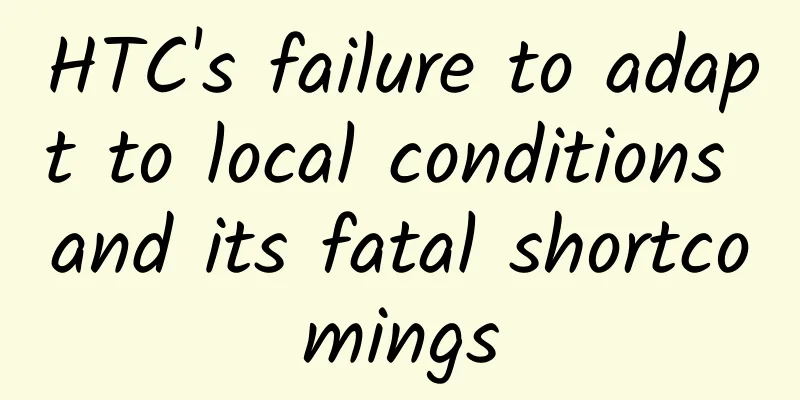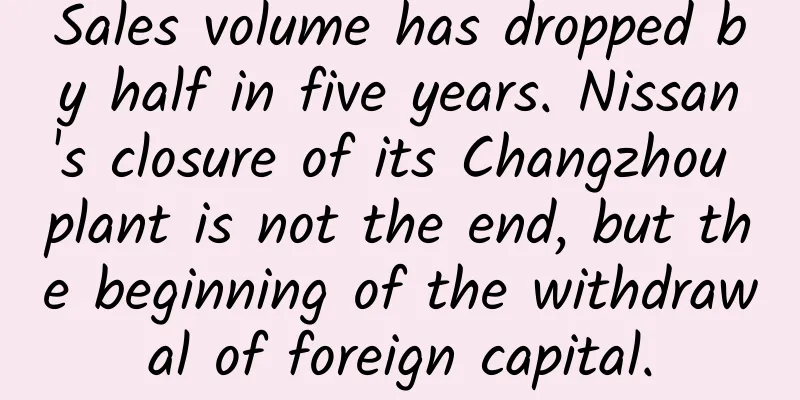HTC's failure to adapt to local conditions and its fatal shortcomings

|
HTC was once the king of the Android camp. In April 2011, HTC's market value reached 33.5 billion US dollars, surpassing Nokia at the time to become the world's second largest smartphone manufacturer. Today, HTC has long lost its former momentum and has become a lost company struggling to find a direction for revitalization. After failing in the international market, HTC began to pay attention to the domestic market. However, the current situation of the domestic market is far from what it was when HTC was popular. Domestic brands are becoming increasingly powerful, making giants like Samsung suffer. 1. Poor Marketing HTC has long been aware of its shortcomings in marketing, but has never been able to come up with any good strategy to improve it. Whether it was the huge sum of money spent to invite "Iron Man" to be its spokesperson, or the serious imitation of Xiaomi's flash sales, it did not achieve much effect. This mobile phone manufacturer, which produced the m7 and m8, which are recognized as first-class by major professional evaluation institutions around the world, seems to be quite an amateur in marketing. HTC cannot afford to invest heavily in advertising like Samsung, and the effect is not necessarily good. Therefore, in the domestic market, it is worth exploring the idea of trying e-commerce channels to buy products, but HTC, which is high-end in nature, did not grasp the vein of this kind of game. Desire820 started the online pre-sale mode, but the final pre-order volume was less than 500,000, and it was delayed in selling out. The popularity is completely different from that of Xiaomi and Meizu. The main reasons are as follows: First, there is no brand that is thriving in the Internet channel in China that does not impress users with super cost-effective products. No matter how big Xiaomi is, its top-end models dare not exceed the 2,000 yuan mark. Meizu's MX4, which has a 20.7-megapixel camera and strong comprehensive performance, has dropped to 1,799 yuan and exploded instantly. For the Internet channel, cost-effectiveness is always the first driving force. Although Desire820 has a certain price-performance ratio compared with HTC's own product line, its configuration is not dazzling (except for the 64-bit Snapdragon mid-range 615 chip, there are no other highlights) and its "destructive power" on user psychology is far less than that of domestic brands. Secondly, HTC's preparation work is not enough and has not attracted widespread attention and expectations. In this regard, HTC should learn from the publicity and promotion of "The Artistic Journey of a Piece of Steel Plate". HTC is a genuine product expert. Although it does not have core technology, it is definitely an expert in manufacturing technology and industrial design. The capital that can be hyped is definitely not just the level of "a piece of steel plate". Thirdly, it is not suitable for HTC to focus on e-commerce channels with its temperament. Although it has lost in the battle with Apple and Samsung, HTC still has an influence in the international market that domestic brands cannot currently match. If it is too entangled in the price-performance battle with domestic brands, it will fall into a situation of losing brand premium, and the result will outweigh the gains. This highlights the contradiction in the competition between HTC and domestic strong e-commerce brands. In view of the above problems, imitating Huawei's dual-brand strategy is a solution. HTC's existing product logic, such as Desire820, is more suitable for the retail distribution channel model of OPPO and Vivo. At the same time, it is a wise move to impact the network channel with a relatively independent e-commerce sub-brand to seize market share and minimize the mutual interference between cost-effective products and high-premium products. 2. One detail reveals the shortcomings "I don't like big black frames, and I don't like four chins. If these two points are missing, I must buy sausages." This is the "feeling" of a domestic netizen about HTC one m8. In fact, users' purchasing decisions for a product are often based on some very simple reasons. Many people buy Samsung phones just because they can change the battery, and many people like MIUI just because its phone book function is very useful. Huawei's Emotion UI's solution to Android's annoying virtual buttons is just a small arrow that can be hidden by clicking, but it has won the favor of many users. Although it is impossible to satisfy everyone with every choice of product details, listening to the user's voice is the basic basis for deciding whether a certain function and design should appear or disappear. Although not everyone "hates" the look of the "four chins", it is at least unimaginable that someone would like this design. Sense is the originator of Android's customized system. Users once described it as the most beautiful and the most humane, but now Sense is far less popular than the controversial MIUI in terms of user stickiness. It's time for HTC to reflect on why it is so casual about some details? 3. Innovation for the sake of innovation Regarding the relationship between enterprises and innovation, Lenovo founder Liu Chuanzhi said that if enterprises do not handle the issue of innovation well, then "not innovating is waiting for death, and once you innovate, you will die immediately." Wang Xuehong once expressed that HTC would never compromise on innovation, emphasizing that in order to regain its glory, it must focus on technology and model innovation. In recent years, HTC has indeed reflected this idea in action. In 2013, the ONEM7, which HTC placed great trust in, improved the camera function at the technical level, using low pixels to impact professional-level photography effects; in terms of mode, E1 mainly promoted customized services, and users can choose parts to assemble the phone according to their needs. Both of these are indeed real innovations, but the problem is that this kind of innovation is more like innovation for innovation, because from the cold reception of market feedback, this kind of innovation does not reflect user orientation. For products, users will never be an absolutely rational judge. 4 million super pixel technology is difficult to overcome people's psychological limitations in the current environment where low-end mobile phones have 13 million pixels. HTC's innovation has never been able to poke the pain points of consumers. HTC recently released three devices at its new product launch conference: M8 Eye, Desire Eyed and RE. Among them, the portable camera RE surprised the outside world. The market positioning and strange shape of the product made people feel a little confused about HTC's hardware strategy. In this regard, HTC Chairman Wang Xuehong said bluntly, "RE is the beginning of our entry into the emerging mobile smart device market, and it is just a prelude." HTC's radical innovation is here again, and it is doubtful whether users can benefit from it. 4. The real gap HTC's fall from its early peak was inevitable. Wang Xuehong has repeatedly said that poor marketing is HTC's biggest problem, but in fact, HTC's real shortcomings are the weakness of the industrial chain and the lack of patented technology. In 2011, HTC was at its peak, immersed in the vision of a bright future, and unaware of the hidden dangers that were slowly approaching. In early 2012, HTC released its flagship model One X. After losing the patent case with Apple, HTC's products, including One X, were banned from sale in North America. In May of the same year, Samsung released the GALAXY S 3 and launched a large-scale promotion. This terrifying production machine was running at full capacity, and the large-scale distribution of the GALAXY S3 came from behind. The tide-like offensive defeated HTC and it has never recovered since then. Although HTC has just emerged from the quagmire of losses, its structural problems have not been solved yet, and the danger of repeating the same mistakes always exists. Although the strengthening of the industrial chain and the accumulation of patented technologies are not overnight, this hidden danger is something HTC must face. If it is just an assembly factory, relying on some innovations without technical barriers and a traditional business model lacking core competitiveness, HTC will find it difficult to support its international brand positioning. As a winner of Toutiao's Qingyun Plan and Baijiahao's Bai+ Plan, the 2019 Baidu Digital Author of the Year, the Baijiahao's Most Popular Author in the Technology Field, the 2019 Sogou Technology and Culture Author, and the 2021 Baijiahao Quarterly Influential Creator, he has won many awards, including the 2013 Sohu Best Industry Media Person, the 2015 China New Media Entrepreneurship Competition Beijing Third Place, the 2015 Guangmang Experience Award, the 2015 China New Media Entrepreneurship Competition Finals Third Place, and the 2018 Baidu Dynamic Annual Powerful Celebrity. |
<<: When will WeChat e-commerce, which is fueled by everyone’s contribution, become more popular?
Recommend
How to create an app with tens of millions of users?
In the era of "users are king", owning a...
Event promotion: A collection of 54 event cases for the 2019 Spring Festival!
During the Spring Festival, major Internet platfo...
Android waterfall photo wall implementation, experience the beauty of irregular arrangement Demo
Source code introduction Android waterfall photo ...
Why are potato chips so delicious? It has something to do with how they look!
It's the autumn outing season again. If you w...
How difficult is it to produce the blue fireworks in the TV series "Nothing But Thirty"?
In the TV series “Nothing But Thirty”, “blue fire...
Mobile and PC management: a difficult but unstoppable path to merger
[[124757]] Obviously, we only jump into a trend w...
Where is the "home" of domestic chickens? Uncovering the 8,000-year history of chicken farming in China!
Chickens are the most widely distributed and most...
5 questions to help you quickly understand the first photo of the black hole at the center of the Milky Way
Last night, the first photo of the black hole at ...
Teach you step by step how to make emoticons
Do you have such feeling? When I was chatting wit...
Traffic thinking is dead, interaction and content marketing are immortal
Recently, I have received messages from some mark...
How to plan an efficient marketing operation plan?
Based on my own experience, I shared how the mobi...
Why are programmers willing to open source their work on GitHub?
[[227457]] From its official launch on April 10, ...
Huawei's new processor Kirin 650 is fully exposed: the first model will be this one!
After releasing P9, Huawei has another new produc...
In a red ocean market with no resource advantages, how did NetEase Cloud Music achieve 300 million users?
In a situation where music player apps are in a c...
Discussing the editing of game interactive texts from the perspective of six steps
It's difficult to write #p#. last_monster_mas...
![Gentle White is Not White · Douyin 0-cost project: single-day income of 500, no work release, no account maintenance [video course]](/upload/images/67cc2821117aa.webp)








